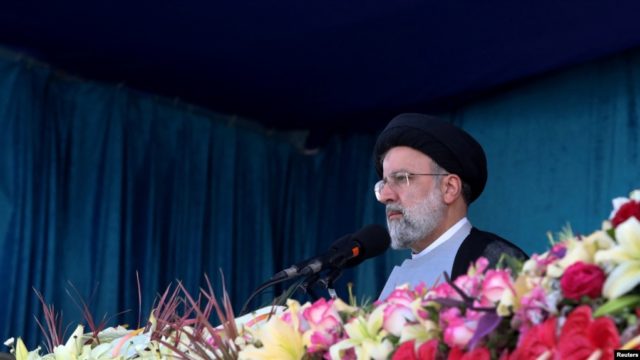
As the Iranian government delegation arrives in New York for the U.N. General Assembly session — First Class, of course — there was some pressure on the State Department to deny their visas. But in a very State Department–ish way, the building declined. Spokesman Vedant Patel said, “The U.S. takes seriously its obligations as a host country of the U.N.” Even, it seems, obligations to governments that try to assassinate your citizens in your country and fire missiles at your embassy in a third country.
The quiescence of the administration is what, in Yiddish, would be called “a shonda.” A disgrace. An embarrassment. A discomfiture. A mortification.
Not even a word from the White House or State Department about the ugliness of a diplomatic welcome for rulers of a country that beat Mahsa Amini to death because hair came out of her hijab; recently hanged three gay people from cranes in public and hanged 12 members of a Sunni group in July; has a special little guillotine to amputate fingers; and is using live ammunition on protesters, killing five in anti-government protests that followed Amini’s death.
Wonder why? The U.S. does not want to rock Iran’s boat. The two sides are agreed on one very important thing: neither wants a nuclear-related deal right now, but neither wants to close off the possibility for future conversation.
On the American side, elections are coming. Announcement of a new Iran deal before November would force a lot of Democrats into a difficult position — either denounce the deal and the president or accept the deal and face the public.
Back in 2015, when President Barak Obama told us that it was the JCPOA or war, a lot of people believed it. When he said the JCPOA “permanently prohibits Iran from obtaining a nuclear weapon,” a lot of people believed it. And when the White House said, “Basically, from the minute [nuclear] materials that could be used for a weapon comes out of the ground to the minute it is shipped out of the country, the IAEA will have eyes on it and anywhere Iran could try and take it,” a lot of people believed it.
But Americans have gotten a lot smarter since 2015. Even the IAEA has gotten smarter.
Iran has been cheating since 2002. The 2009 “going in position” that they gave the IAEA was a lie. They lied through the 2011–2015 talks, and they lied and cheated through the 2018 sanctions and after. They lied and cheated right through the summer of 2022, when the IAEA found traces of uranium where there weren’t supposed to be any. When the IAEA complains, you know it’s serious.
And, except during the Donald Trump administration, Iran paid no appreciable price.
In 2021, the mullahs believed, correctly, that President Joe Biden would lift or waive sanctions and the money would flow on the “if come.” Decisions to take Yemen’s Houthis off the State Department terror list, free up money from South Korea, allow China to buy oil without sanction were all made in the earliest days of 2021 with no demand for reciprocity. The opposite: The administration then agreed to a series of humiliating Iranian demands, beginning with sitting outside the conference room in Vienna and allowing the E.U., Russia, and China to represent American interests to Iran and Iranian interests to us.
For two and a half years, right up to last week, Iran dangled the possibility of new negotiations, only to add on new — and blatantly unacceptable — conditions to a potential deal. As Iranian delays and demands continued, Tehran pursued its nuclear capability as well as the ongoing decimation of Iraq, Syria, Hezb’allah, and Yemen. And increased support for Hamas as it opens the next phase of its war against Fatah for control of the West Bank.
With no pushback, why make a new deal? The gifts kept coming and, perhaps, will again.
French foreign minister Catherine Colonna told reporters gathered for the U.N. General Assembly that there are no initiatives underway to restart talks, stressing that the U.S., the E.U., and the IAEA are fully agreed on their position vis-à-vis Iran. That sounds fairly definitive, but she missed the underlying point. While there is no desire on either side for talks now, later might be a different story — Iran hinted again that it might be willing to return to Vienna.
Biden is unlikely to respond until mid-November.

